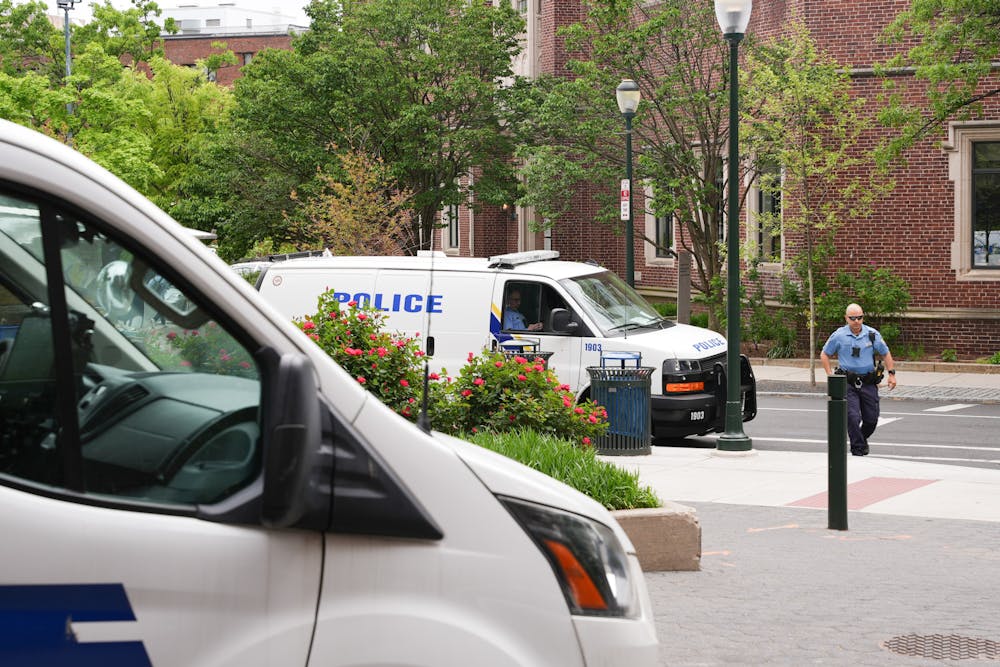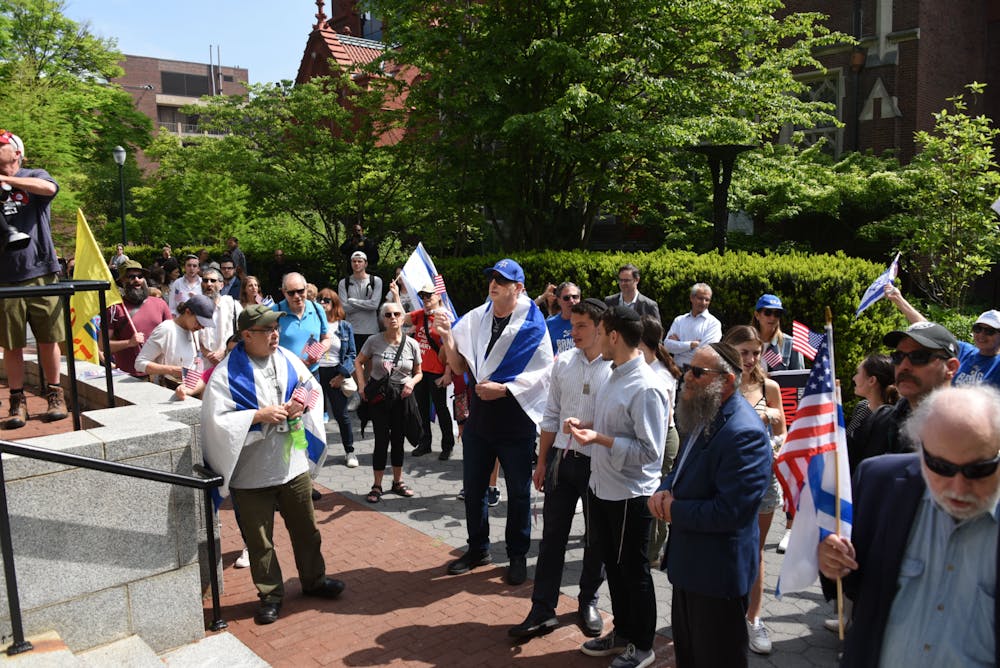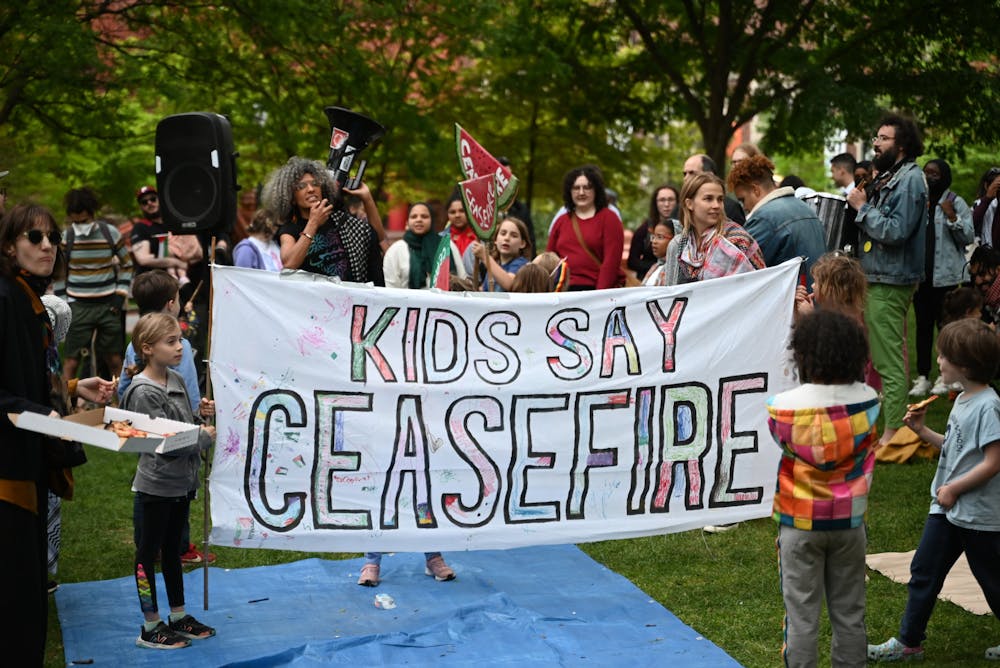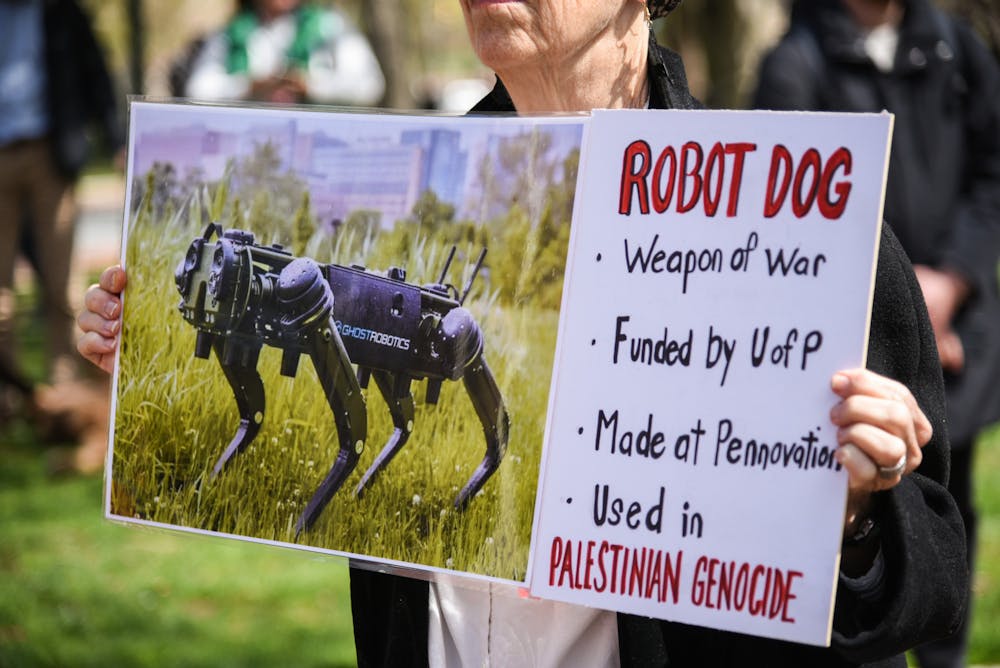Read all of our coverage of the Gaza Solidarity Encampment here.
It’s been one week since Interim Penn President Jameson ordered the Gaza Solidarity Encampment to immediately disband — but the pro-Palestinian protesters have shown no evidence they will comply, and the University has given little indication it intends to act to intervene.
In the seven days since Jameson's last message to the University community, protesters have met at least twice for negotiations with the interim president and Provost John Jackson. Officials have served several protesters with disciplinary notices, while pro-Palestinian programming has continued alongside visits from numerous politicians. Meanwhile, pro-Israeli counterprotests have appeared at a consistent pace near the encampment — with protesters on both sides at times entering confrontations with one another and the police.
As the second week of the encampment began, however, the University suggested through a spokesperson that it was all but in a stalemate with demonstrators.
Penn leans on city, public safety officials for encampment response
Though they have yet to take action to forcibly remove the encampment, Penn administrators continue to condemn the protesters' approach and has called on them to take their tents down, citing legal and policy violations as well as alleged incidents of harassment.
In a Friday evening statement, the University wrote that it had again "communicated that the encampment must disband" and explained that it had offered accommodations to allow organizers to "continue their protest in ways that do not conflict with safety and policy."
The statement said administrators have met twice with student and faculty protestors to "hear their views and try to find a productive path forward."
"We also stated our desire to move beyond a posture of demand vs. counter-demand and towards shared opportunities that help create a more inclusive, respectful campus environment,” the statement read.

The University's emphasis on safety in its latest statement came hours after videos circulated on social media which showed encampment participants confronting a Jewish student and shining bright lights in his face.
The videos, which together are nearly six minutes long, were filmed by a Jewish student walking near the encampment. At one point, the Jewish student asked an encampment participant if they were a student. The person in the video responded, “What are you going to do about it?”
The encampment participant repeatedly told the Jewish student that he was “not coming in the camp,” to “back up,” and not “do something you’re going to regret."
The Division of Public Safety “was made aware of this alarming video” and reached out to the student affected “for more information on the incident and to provide support," a University spokesperson wrote in a statement to The Daily Pennsylvanian. The videos were tweeted by College senior Eyal Yakoby.
The DP could not confirm whether DPS has reached out to the student or whether the encampment participant was a student. An encampment participant did not respond to a request for comment.
"The encampment presents a danger to the community," Yakoby wrote in a message critical of Penn's response. "… We have heard nothing from the [administration], but we have heard a whole lot from the encampment."
Yakoby condemned several choices made by encampment members over the course of their demonstration, including the waving of the Popular Front for the Liberation of Palestine flag, the chanting of "Al Qassam make us proud," and usage of slurs towards Jewish students.
"Penn is teaching a lesson that unlawfulness yields results, which is not only dangerous, but a horrible precedent to start," Yakoby wrote.
The DP could not independently corroborate Yakoby's allegation that encampment members have used slurs towards Jewish students. He further criticized the administration for engaging in several discussions with encampment members, while failing to confirm receipt of his petition — which received over 3,200 signatures — asking the University to "stand by its word" and take action against the encampment.
"It’s time for the [administration] to break their silence, because it is the students who are being put in danger," Yakoby wrote.

Meanwhile, early Friday morning, counter protesters with bullhorns and air sirens approached the Gaza Solidarity Encampment. A video purportedly taken at 3 a.m. and posted on the instagram account @jewishbreakingnews shows a counter protester shouting, "time to wake up," and "wake up, terrorists," while another counter protester waved an American flag.
The incident was confirmed to the DP by a source familiar with the matter. A student organizer at the encampment told NBC10 that they experienced "unprecedented" harassment compared to other nights.
"While this is certainly not physical violence, one could consider it a mental tactic to harm the students and members of our community," they said.
Encampment welcomes city activists, families for pro-Palestinian programming
As administrators showed little sign of imminent interference with the approximately 35 tents pitched on College Green, organizers offered a range of programming on Friday — including an after-school event for children, a community dinner and a guest speaker.
The encampment remained quiet — absent any large demonstrations — throughout the day. Police remained present but did not increase in numbers at any point. Members chanted and chalked pro-Palestinian messages, while families gathered peacefully on College Green.
At around 6:15 p.m., approximately 100 children and their families marched down Locust Walk to the encampment, chanting and holding a banner that read “Kids Say Ceasefire.”
The group — the majority of whom were toddlers — was affiliated with Families for Ceasefire Philly, an organization that seeks to bring together children, families and caregivers to "end the genocide in Gaza." Encampment members joined the chants, which included “free Palestine,” “from the river to the sea,” “disclose, divest, we will not stop we will not rest,” and “I believe that we will win.”
At around 8 p.m., Mumia Abu-Jamal — a Philadelphia native, former Black Panther Party member, and imprisoned political activist — spoke via phone to a crowd of around 100 encampment members, telling them they were doing “the rightest thing in the world."

“You are being punished for protesting genocide,” Abu-Jamal said, encouraging protesters to be patient. “For that, you should not be punished. You should be rewarded.”
After Abu-Jamal's remarks, a speaker identified as Gabe discussed solidarity with the Palestinian cause in Philadelphia and around the world.
“Use those shared histories and shared moments to align ourselves, to coordinate ourselves,” Gabe said.
The encampment has continued to welcome activists from the city and beyond. On Thursday, co-founder of Students for Justice in Palestine and University of California at Berkeley professor Hatem Bazian spoke to the encampment about their cause and student activism and its history.
With Columbia's response to its own encampments and the occupation of an academic building fresh on protesters' minds, Bazian criticized the New York Police Department, which he compared to the size of the “national army” of some countries.
“You were right in the labor movement. You were right in the women’s movement. You were right during the Vietnam War. You were right during the free speech movement,” Bazian said. “And you are right … in Palestine, no matter what they say.”
A small group of counterprotesters played graphic footage from the Oct. 7, 2023, Hamas attacks on Israel on a projector facing the encampment.
Gov. Josh Shapiro calls on Penn to keep students safe
Pennsylvania Gov. Josh Shapiro defended the right to peacefully protest on college campuses but declined to confirm whether Penn’s encampment was peaceful during a visit to Philadelphia on May 3.
“People have a right to peacefully protest and to voice their objection to something they see in their neighborhoods, in their community … or across the globe,” he said. “And I support that right to peacefully protest.”
Shapiro went on to say that the right to peaceful protest does not excuse “antisemitism, or Islamophobia, or any other forms of hate” and that any protests must follow campus, city, and commonwealth rules.

He called on Penn’s leadership to keep students safe and said that Penn has not requested help from state police to disband the encampment. According to The Philadelphia Inquirer, Shapiro has been in “regular communication” with Penn administrators and Philadelphia Mayor Cherelle Parker’s administration.
The criteria Penn may be weighing before arresting protesters
While Penn officials have escalated their actions against the encampment but remained a step away from directly intervening, one professor who was granted anonymity said the University's decision to discipline or arrest protesters cannot be based on "guilt by association."
The professor said Penn must have “specific evidence as to a particular person, and even specific intent” to take disciplinary action against an individual.
Students cannot be penalized by the University solely for their participation in the demonstration — which would be characterized as “guilt by association” — without specific evidence of violations against Penn’s Guidelines on Open Expression, the professor said.
However, the professor said the University would reserve the right to clear the entire encampment by alleging that the encampment was on Penn’s private property and individuals participating were trespassing.
The professor said that recent actions by administrators, such as having a fire marshal sweep tents, could be characterized as intimidation. Requiring identification from every individual in the encampment violated provision V.C.1 of Penn’s Guidelines on Open Expression, the professor said in agreement with the statement released on April 29 by the Executive Committee of the Penn chapter of the American Association of University Professors.
“What they're trying to do is scare kids to get them to go away,” the professor said. “If that's the case, I would be super delighted to help represent students and harass the University about that. That's absolutely not cool.”
The encampment has continued to impact the University's academic operations. Multiple traditions, including U-Night, Hey Day, and Final Toast, were moved elsewhere or re-routed; while Penn has relocated several final exams away from College Hall.
"Given Penn's academic mission, it is important that our students have optimal exam writing conditions," a University spokesperson wrote. "In some instances, the University believes these conditions are best met in alternative locations.
Polls close in the Muslim Student Association's divestment referendum
Amid national calls on college campuses for divestment from Israel-connected corporations — and encampment participants' own demands of Penn to disclose its investments — the ballot for MSA's referendum asking questions related to the University's response to the Israel-Hamas war closed on Friday. The Undergraduate Assembly has yet to release the results of the vote.
The referendum asked students four questions — including whether the University should divest its endowment fund from companies and organizations that “profit from, engage in, or contribute to the government of Israel’s human rights violations."
While the results act as a measure of student sentiment, the University has no obligation to respond in accordance — and a spokesperson reiterated Penn's opposition to "sanctions, boycotts, or disinvestment targeted against Israel" on Thursday night.
In the statement, the spokesperson explained that Penn has "been clear about this issue for more than a decade" — and added that divestment from Israel is against the law in the Commonwealth of Pennsylvania.
In addition to questions on divestment, the referendum surveyed students on whether the Penn Board of Trustees should publicly disclose all investments held through the endowment fund. The remaining question asked if Penn should terminate all partnerships and ties with Ghost Robotics — which it described as "the developers of drone-mounted robot dogs purchased by the Israeli government used to commit human rights violations."

MSA first circulated the referendum through a petition on April 24, which quickly received the 500 votes necessary for approval by the Nominations & Elections Committe, and NEC approved the questions for a ballot vote the same night. Voting — which opened on April 25 — was originally scheduled to close on May 1, but Penn's student government extended it through May 3 after Jewish students expressed criticism regarding the voting period aligning with Passover.
NEC Chair Yousef Elyoussef did not respond to the DP's request for comment on when the results would be released.
The Daily Pennsylvanian is an independent, student-run newspaper. Please consider making a donation to support the coverage that shapes the University. Your generosity ensures a future of strong journalism at Penn.
Donate





Most Read
Department of Education opens investigation into Penn over ‘inaccurate’ foreign donation disclosures
Former Penn swimmers applaud Department of Education ruling that Penn violated Title IX
As deadline nears for Penn to comply with Department of Education demands, University remains silent
More Like This